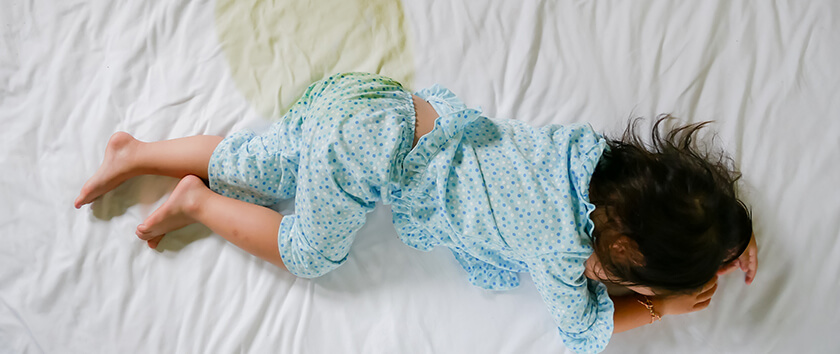
Pine Cone Health
Bed Wetting – What you Need to Know
Bedwetting, also called nocturnal enuresis, is when there is an involuntarily loss of urine during sleep. It is more common in boys than in girls (Barone et al., 2009). As children age, and their daytime and nighttime bladder and bowel control improves, bedwetting usually goes away. In fact, bedwetting should be completely resolved by the age of 5, but some kids (and their families) continue to struggle. It is estimated that 5-12% of 7 year olds still experience bedwetting (Sinha & Raut, 2016).
Bed wetting can be genetic. If both parents of the child experienced bed wetting as children, there is a high chance the child will experience bed wetting as well. It has even been shown that even if one parent had bed wet as a child, their children have a 44% chance of wetting the bed (Sinha & Raut, 2016). Causes of bedwetting can include a delay in the ability to hold a normal amount of urine in the bladder, sleep arousal disorders, a smaller amount of anti-diuretic hormone that increases during sleep to help us not have to pee at night as well as constipation (Sinha & Raut, 2016). A pediatric pelvic health physiotherapist can help find the cause of the bed wetting in hopes to find an appropriate treatment option.
Bedwetting Treatment
Treatment often involves education around bed wetting as well as normalizing the experience for the child. Making a bigger deal of the bed wetting than it is can cause an increase anxiety in the child and make success with treatment more difficult. It is important in treatment to work with the therapist and child to develop a regular sleep, meal and fluid routine. Other treatments involved in therapy are positive reinforcement, bed pads, alarm systems, medication and treating any other causes involved such as constipation. The treatment is specific to the child to achieve the best results (Brown et al., 2018).
Call us today for an appointment to learn if pediatric physiotherapy is right for you!
References:
Barone, J. G., Jasutkar, N., & Schneider, D. (2009). Later toilet training is associated with urge incontinence in children. Journal of Pediatric Urology, 5(6), 458-461.
Brown, C., Lord, M.J., & Valancogne, G. (2018). Pelvic Floor Physiotherapy in Paediatrics [PDF Document].
Sinha, R., & Raut, S. (2016). Management of nocturnal enuresis-myths and facts. World Journal of Nephrology, 5(4), 328.
